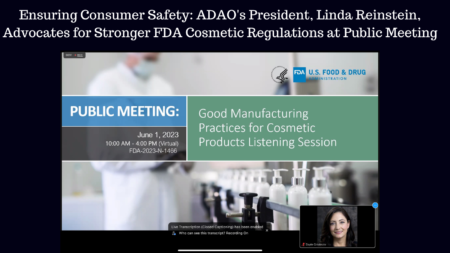Posted on June 1, 2023
Today, ADAO president and co-founder, Linda Reinstein, spoke at the Food and Drug Administration’s Public Meeting on Good Manufacturing Practices for Cosmetic Products about their role in keeping Americans safe from asbestos-contaminated products. Read her remarks:
Ensuring Consumer Safety: ADAO’s President, Linda Reinstein, Advocates for Stronger FDA Cosmetic Regulations at Public Meeting
“Thank you for the opportunity to address this esteemed panel today.
 My name is Linda Reinstein, and I am the co-founder of the Asbestos Disease Awareness Organization (ADAO), an independent nonprofit organization. Asbestos has deeply impacted my life, as it took away my husband and the father of my daughter. I am humbled to represent tens of thousands of families like mine who have been harmed by preventable illnesses caused by toxic products.
My name is Linda Reinstein, and I am the co-founder of the Asbestos Disease Awareness Organization (ADAO), an independent nonprofit organization. Asbestos has deeply impacted my life, as it took away my husband and the father of my daughter. I am humbled to represent tens of thousands of families like mine who have been harmed by preventable illnesses caused by toxic products.
For nearly twenty years, ADAO has been dedicated to preventing asbestos exposure and eliminating all asbestos-caused diseases. Today, I am honored to be joined by nearly 100 individuals from over 20 countries who are registered to discuss improving cosmetic safety. I am here because public health and safe consumer products are of paramount importance to the life and liberty of our citizens.
Despite Americans’ trust in the safety of consumer products and cosmetics, the reality is that U.S. regulations are outdated. The FDA Cosmetic Act was passed in 1938 and has only banned 11 ingredients in cosmetics, and asbestos is not on that list.
I previously spoke at the 2020 “Testing Methods for Asbestos in Talc and Cosmetic Products Containing Talc” meeting and have witnessed the significant divide between industry and public health organizations.
While the FDA has jurisdiction over personal care products and cosmetics, the Environmental Protection Agency (EPA) has jurisdiction over chemicals. Both agencies are focused on asbestos risk management.
Today, I would like to use asbestos as an example of toxic cosmetic contamination and the failures in risk management. I will present four key facts:
- Asbestos is a known human carcinogen.
- There is no safe level of exposure to asbestos.
- Approximately 40,000 Americans die from asbestos-related diseases each year.
- Without an asbestos ban, imports and use of asbestos will continue.
I want to emphasize that standardized testing, transparency, and enforcement are lacking in cosmetic and consumer safety.
Fifteen years ago, ADAO conducted independent product tests using the existing testing processes and safety protocols. Our shocking findings confirmed that five products, including a child’s toy, were contaminated with asbestos. In response, the industry attempted to mount a defense based on low-level testing protocols in hopes of negating our results. Sadly, this type of response is not uncommon, but it is wildly insufficient.
While testing is necessary and prudent, it alone will not eliminate toxic exposure. Prohibiting toxic materials and their use is the only way to prevent future public health disasters and restore consumer trust in our system.
While we commend the FDA’s proactive approach in addressing the risks of asbestos exposure from talc-containing cosmetic products, we must caution that this is only one part of the solution. Asbestos risk is unmanageable. ADAO and our allies continue to urge Congress to pass the Alan Reinstein Ban Asbestos Now (ARBAN) Act, an amendment to the EPA’s Toxic Substances Control Act (TSCA), which will eliminate importation and use of asbestos in the United States. This ban would encourage the cosmetic industry to embrace non-asbestos ingredients.
In conclusion, I sincerely thank the FDA for convening this public meeting on GMPs for cosmetic products. These discussions lay the foundation for a safer cosmetic industry. Let us seize this moment and redouble our efforts to strengthen asbestos prevention and policy, preserving and protecting the health and well-being of all consumers from this unnecessary carcinogenic threat.
Thank you for your attention today. We will submit our expanded comments to the docket for consideration. Together, we can work towards a future where all Americans are safe from asbestos and protected from its devastating health effects.”
